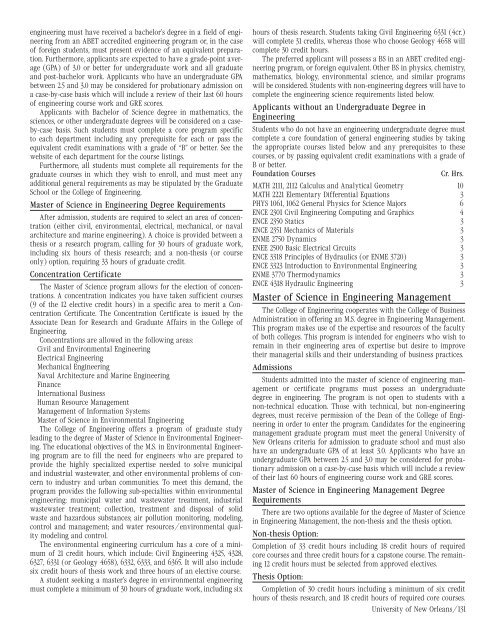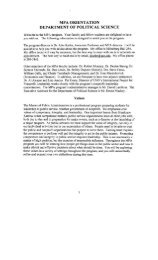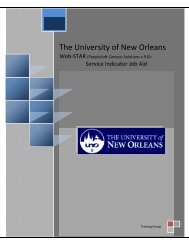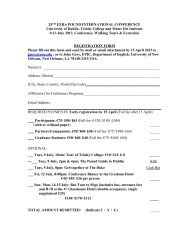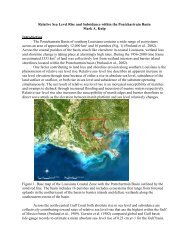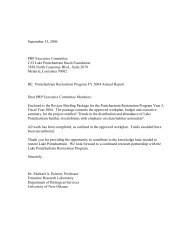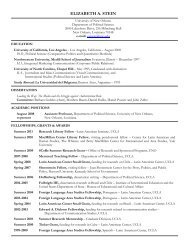Untitled - University of New Orleans
Untitled - University of New Orleans
Untitled - University of New Orleans
You also want an ePaper? Increase the reach of your titles
YUMPU automatically turns print PDFs into web optimized ePapers that Google loves.
engineering must have received a bachelor’s degree in a field <strong>of</strong> engineering<br />
from an ABET accredited engineering program or, in the case<br />
<strong>of</strong> foreign students, must present evidence <strong>of</strong> an equivalent preparation.<br />
Furthermore, applicants are expected to have a grade-point average<br />
(GPA) <strong>of</strong> 3.0 or better for undergraduate work and all graduate<br />
and post-bachelor work. Applicants who have an undergraduate GPA<br />
between 2.5 and 3.0 may be considered for probationary admission on<br />
a case-by-case basis which will include a review <strong>of</strong> their last 60 hours<br />
<strong>of</strong> engineering course work and GRE scores.<br />
Applicants with Bachelor <strong>of</strong> Science degree in mathematics, the<br />
sciences, or other undergraduate degrees will be considered on a caseby-case<br />
basis. Such students must complete a core program specific<br />
to each department including any prerequisite for each or pass the<br />
equivalent credit examinations with a grade <strong>of</strong> “B” or better. See the<br />
website <strong>of</strong> each department for the course listings.<br />
Furthermore, all students must complete all requirements for the<br />
graduate courses in which they wish to enroll, and must meet any<br />
additional general requirements as may be stipulated by the Graduate<br />
School or the College <strong>of</strong> Engineering.<br />
Master <strong>of</strong> Science in Engineering Degree Requirements<br />
After admission, students are required to select an area <strong>of</strong> concentration<br />
(either civil, environmental, electrical, mechanical, or naval<br />
architecture and marine engineering). A choice is provided between a<br />
thesis or a research program, calling for 30 hours <strong>of</strong> graduate work,<br />
including six hours <strong>of</strong> thesis research; and a non-thesis (or course<br />
only) option, requiring 33 hours <strong>of</strong> graduate credit.<br />
Concentration Certificate<br />
The Master <strong>of</strong> Science program allows for the election <strong>of</strong> concentrations.<br />
A concentration indicates you have taken sufficient courses<br />
(9 <strong>of</strong> the 12 elective credit hours) in a specific area to merit a Concentration<br />
Certificate. The Concentration Certificate is issued by the<br />
Associate Dean for Research and Graduate Affairs in the College <strong>of</strong><br />
Engineering.<br />
Concentrations are allowed in the following areas:<br />
Civil and Environmental Engineering<br />
Electrical Engineering<br />
Mechanical Engineering<br />
Naval Architecture and Marine Engineering<br />
Finance<br />
International Business<br />
Human Resource Management<br />
Management <strong>of</strong> Information Systems<br />
Master <strong>of</strong> Science in Environmental Engineering<br />
The College <strong>of</strong> Engineering <strong>of</strong>fers a program <strong>of</strong> graduate study<br />
leading to the degree <strong>of</strong> Master <strong>of</strong> Science in Environmental Engineering.<br />
The educational objectives <strong>of</strong> the M.S. in Environmental Engineering<br />
program are to fill the need for engineers who are prepared to<br />
provide the highly specialized expertise needed to solve municipal<br />
and industrial wastewater, and other environmental problems <strong>of</strong> concern<br />
to industry and urban communities. To meet this demand, the<br />
program provides the following sub-specialties within environmental<br />
engineering: municipal water and wastewater treatment, industrial<br />
wastewater treatment; collection, treatment and disposal <strong>of</strong> solid<br />
waste and hazardous substances; air pollution monitoring, modeling,<br />
control and management; and water resources/environmental quality<br />
modeling and control.<br />
The environmental engineering curriculum has a core <strong>of</strong> a minimum<br />
<strong>of</strong> 21 credit hours, which include: Civil Engineering 4325, 4328,<br />
6327, 6331 (or Geology 4658), 6332, 6333, and 6365. It will also include<br />
six credit hours <strong>of</strong> thesis work and three hours <strong>of</strong> an elective course.<br />
A student seeking a master’s degree in environmental engineering<br />
must complete a minimum <strong>of</strong> 30 hours <strong>of</strong> graduate work, including six<br />
hours <strong>of</strong> thesis research. Students taking Civil Engineering 6331 (4cr.)<br />
will complete 31 credits, whereas those who choose Geology 4658 will<br />
complete 30 credit hours.<br />
The preferred applicant will possess a BS in an ABET credited engineering<br />
program, or foreign equivalent. Other BS in physics, chemistry,<br />
mathematics, biology, environmental science, and similar programs<br />
will be considered. Students with non-engineering degrees will have to<br />
complete the engineering science requirements listed below.<br />
Applicants without an Undergraduate Degree in<br />
Engineering<br />
Students who do not have an engineering undergraduate degree must<br />
complete a core foundation <strong>of</strong> general engineering studies by taking<br />
the appropriate courses listed below and any prerequisites to these<br />
courses, or by passing equivalent credit examinations with a grade <strong>of</strong><br />
B or better.<br />
Foundation Courses<br />
Cr. Hrs.<br />
MATH 2111, 2112 Calculus and Analytical Geometry 10<br />
MATH 2221 Elementary Differential Equations 3<br />
PHYS 1061, 1062 General Physics for Science Majors 6<br />
ENCE 2301 Civil Engineering Computing and Graphics 4<br />
ENCE 2350 Statics 3<br />
ENCE 2351 Mechanics <strong>of</strong> Materials 3<br />
ENME 2750 Dynamics 3<br />
ENEE 2500 Basic Electrical Circuits 3<br />
ENCE 3318 Principles <strong>of</strong> Hydraulics (or ENME 3720) 3<br />
ENCE 3323 Introduction to Environmental Engineering 3<br />
ENME 3770 Thermodynamics 3<br />
ENCE 4318 Hydraulic Engineering 3<br />
Master <strong>of</strong> Science in Engineering Management<br />
The College <strong>of</strong> Engineering cooperates with the College <strong>of</strong> Business<br />
Administration in <strong>of</strong>fering an M.S. degree in Engineering Management.<br />
This program makes use <strong>of</strong> the expertise and resources <strong>of</strong> the faculty<br />
<strong>of</strong> both colleges. This program is intended for engineers who wish to<br />
remain in their engineering area <strong>of</strong> expertise but desire to improve<br />
their managerial skills and their understanding <strong>of</strong> business practices.<br />
Admissions<br />
Students admitted into the master <strong>of</strong> science <strong>of</strong> engineering management<br />
or certificate programs must possess an undergraduate<br />
degree in engineering. The program is not open to students with a<br />
non-technical education. Those with technical, but non-engineering<br />
degrees, must receive permission <strong>of</strong> the Dean <strong>of</strong> the College <strong>of</strong> Engineering<br />
in order to enter the program. Candidates for the engineering<br />
management graduate program must meet the general <strong>University</strong> <strong>of</strong><br />
<strong>New</strong> <strong>Orleans</strong> criteria for admission to graduate school and must also<br />
have an undergraduate GPA <strong>of</strong> at least 3.0. Applicants who have an<br />
undergraduate GPA between 2.5 and 3.0 may be considered for probationary<br />
admission on a case-by-case basis which will include a review<br />
<strong>of</strong> their last 60 hours <strong>of</strong> engineering course work and GRE scores.<br />
Master <strong>of</strong> Science in Engineering Management Degree<br />
Requirements<br />
There are two options available for the degree <strong>of</strong> Master <strong>of</strong> Science<br />
in Engineering Management, the non-thesis and the thesis option.<br />
Non-thesis Option:<br />
Completion <strong>of</strong> 33 credit hours including 18 credit hours <strong>of</strong> required<br />
core courses and three credit hours for a capstone course. The remaining<br />
12 credit hours must be selected from approved electives.<br />
Thesis Option:<br />
Completion <strong>of</strong> 30 credit hours including a minimum <strong>of</strong> six credit<br />
hours <strong>of</strong> thesis research, and 18 credit hours <strong>of</strong> required core courses.<br />
<strong>University</strong> <strong>of</strong> <strong>New</strong> <strong>Orleans</strong>/131


